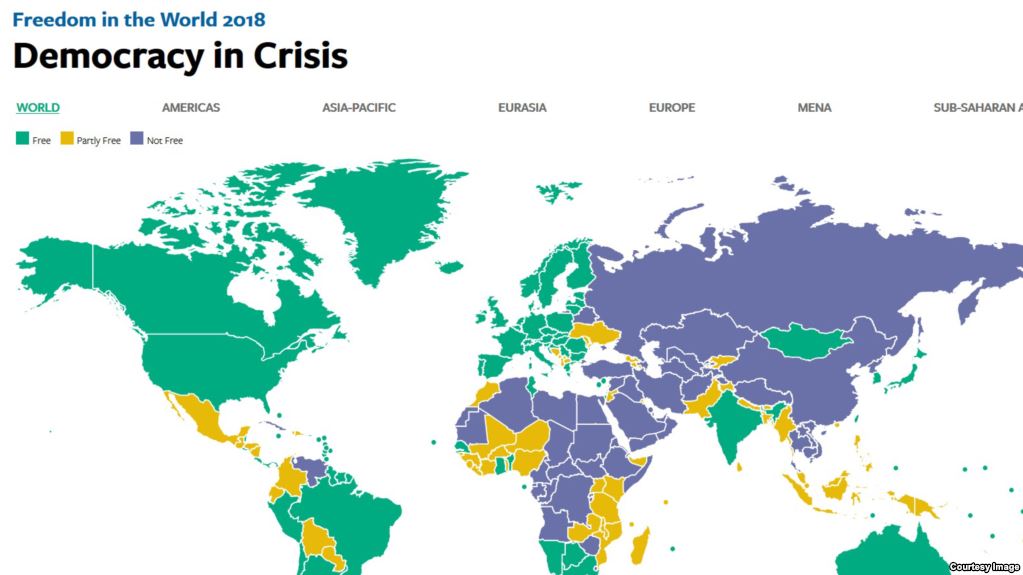
Former President Obama will “echo his call to reject the rising strain of authoritarian politics and policies” when he accepts an award for ethics in government next week, The Hill reports.  He will insist “that America is at its best when democracy is inclusive and citizens are engaged,” in a speech to receive the University of Illinois at Urbana-Champaign’s Paul H. Douglas Award for Ethics in Government during a ceremony on Sept. 7.
He will insist “that America is at its best when democracy is inclusive and citizens are engaged,” in a speech to receive the University of Illinois at Urbana-Champaign’s Paul H. Douglas Award for Ethics in Government during a ceremony on Sept. 7.
Are we on the brink of a post-democratic era? The data leave little room for doubt, argues Prof. Yoram Peri, director of the Gildenhorn Institute of Israel Studies at the University of Maryland. The latest annual report of the New York-based organization Freedom House paints a grim picture (above): In 2017, the civil rights situation worsened in 71 countries – a trend of deterioration that has continued for 12 years – and only 39 percent of the world’s population is living in conditions of “freedom.” Still, some foresaw the trend, he writes for Haaretz:
One of the most significant of these writers was Thomas Piketty, who in 2014 published “Capital in the Twenty-First Century.” In this 700-page book, the French economist described the exacerbation of economic inequality since the 1980s, and warned against the consequences of the deepening disparity. Democracies, he observed, cannot be sustained in the face of such gaps, which sooner or later will generate a revolt by the masses.
 While analyst Walter Russell Mead recently dismissed the democratic recession as “hype”, it is clear that even long-established, ostensibly consolidated democracies are regressing.
While analyst Walter Russell Mead recently dismissed the democratic recession as “hype”, it is clear that even long-established, ostensibly consolidated democracies are regressing.
An authoritarian India is beginning to emerge, according to one account, while others refer to India’s stealth war on liberal democracy.
A crackdown on India’s civil society has prompted sharp responses from news media, government critics and public intellectuals, who called the charges a pretext for Prime Minister Narendra Modi’s government to punish dissenters, The New York Times adds:
 Prashant Bhushan, an Indian lawyer, activist and opposition politician, drew a parallel to the 1970s, when Prime Minister Indira Gandhi suspended elections and curbed civil liberties for 21 months to tighten her grip on power. “The arrests and raids are outrageous attempts to stifle voices of dissent and curb peaceful struggles against this government’s anti-people ideology,” Mr. Bhushan wrote. “Democracy is under siege in India.”
Prashant Bhushan, an Indian lawyer, activist and opposition politician, drew a parallel to the 1970s, when Prime Minister Indira Gandhi suspended elections and curbed civil liberties for 21 months to tighten her grip on power. “The arrests and raids are outrageous attempts to stifle voices of dissent and curb peaceful struggles against this government’s anti-people ideology,” Mr. Bhushan wrote. “Democracy is under siege in India.”
Have liberal democrats in the advanced democracies underestimated the appeal of authoritarianism?
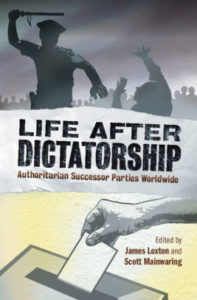 Authoritarian successor parties that emerge from authoritarian regimes, but operate after a democratic transition are one of the most common but overlooked features of the global democratic landscape, according to Life after Dictatorship: Authoritarian Successor Parties Worldwide by James Loxton and Scott Mainwaring. They remain major actors in Africa, Asia, Europe, and Latin America, and have been voted back into office in over one-half of all third-wave democracies
Authoritarian successor parties that emerge from authoritarian regimes, but operate after a democratic transition are one of the most common but overlooked features of the global democratic landscape, according to Life after Dictatorship: Authoritarian Successor Parties Worldwide by James Loxton and Scott Mainwaring. They remain major actors in Africa, Asia, Europe, and Latin America, and have been voted back into office in over one-half of all third-wave democracies
A spate of recent books raising the alarm over authoritarian threats to democracy are unconvincing, says Michael Anton, a lecturer and research fellow at Hillsdale College, a senior fellow at the Claremont Institute, and a former national security official in the Trump administration. The exception is William Galston’s Anti-Pluralism, he adds.
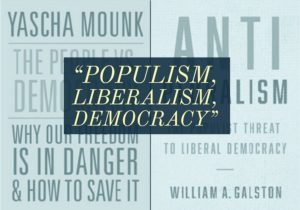 “Not because I agree with all of it. But because if liberals were more like the Brookings Institution senior fellow and former deputy assistant to President Bill Clinton, our predicament would be much less dire,” he writes for The Claremont Review of Books:
“Not because I agree with all of it. But because if liberals were more like the Brookings Institution senior fellow and former deputy assistant to President Bill Clinton, our predicament would be much less dire,” he writes for The Claremont Review of Books:
- First, because Galston’s theoretical grasp of where we are and how we got here is much sounder than all the others’ combined. (Though not flawless. There’s a little too much rote-Straussian “modernity is low” and overemphasis on the tension between liberty and equality. But this does not negate the book’s many strengths.)
- Second, because his acknowledgment that the concerns of Trump voters and of globalization’s “losers” are legitimate and deserve a political response appears to be sincere.
- Third, because his proposed solutions actually address the serious problems of our time, the very problems that the anti-Trump “conservatives”—no less, and perhaps more than, the Left—have ignored, denied, and exacerbated. Galston even has moderate, sensible things to say about immigration and the culture.
 Harvard professor Yascha Mounk’s book includes troubling public opinion findings about declining support for democracy in the US, particularly among millennials, notes AEI analyst Karlyn Bowman. But others, using the same World Values Survey data that Mounk uses, reach different conclusions, she adds. Erik Voeten of Georgetown University, argues that “trends in overall support for democracy and non-democratic alternatives have been flat for the past two decades,” and that “there is no threat to consolidated democracies” such as the United States.
Harvard professor Yascha Mounk’s book includes troubling public opinion findings about declining support for democracy in the US, particularly among millennials, notes AEI analyst Karlyn Bowman. But others, using the same World Values Survey data that Mounk uses, reach different conclusions, she adds. Erik Voeten of Georgetown University, argues that “trends in overall support for democracy and non-democratic alternatives have been flat for the past two decades,” and that “there is no threat to consolidated democracies” such as the United States.
The emergence of identity politics is a further threat to liberal democracy, analysts suggest.
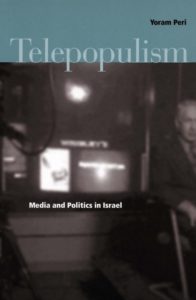 Anxiety about the loss of national identity generates a return to nationalism – of the organic rather than the liberal variety, engendering the cultivation of tribalism and the strengthening of religion, adds Peri, an adviser to the late Prime Minister Yitzhak Rabin, and the author of “Telepopulism: Media and Politics in Israel” (Stanford University Press). It was Ronald Inglehart, author of a recent Foreign Affairs article, “The Age of Insecurity,” who, 40 years ago, developed the thesis of post-material values, he notes:
Anxiety about the loss of national identity generates a return to nationalism – of the organic rather than the liberal variety, engendering the cultivation of tribalism and the strengthening of religion, adds Peri, an adviser to the late Prime Minister Yitzhak Rabin, and the author of “Telepopulism: Media and Politics in Israel” (Stanford University Press). It was Ronald Inglehart, author of a recent Foreign Affairs article, “The Age of Insecurity,” who, 40 years ago, developed the thesis of post-material values, he notes:
In the past, he explained, people were guided by material needs such as food, clothing, housing and economic welfare. Toward the end of the 20th century they were motivated by different values: self-fulfillment, autonomy, freedom of speech, gender equality, environmental quality. Those are banners that the new political elites willingly hoisted. The latest economic crisis, however, led the wider public to re-embrace the material values, leading to a clash between these two sets of values.
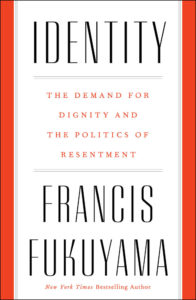 From Warsaw to Rome, London to Washington, every social, political and economic debate is colored by identity. Where once differences in background and culture were celebrated as inspiring multiculturalism, they now feed perceptions of unbridgeable division. Where once immigration was seen as enriching western societies, it is now considered a cause of distress, notes FT analyst Roula Khalaf:
From Warsaw to Rome, London to Washington, every social, political and economic debate is colored by identity. Where once differences in background and culture were celebrated as inspiring multiculturalism, they now feed perceptions of unbridgeable division. Where once immigration was seen as enriching western societies, it is now considered a cause of distress, notes FT analyst Roula Khalaf:
As Francis Fukuyama* argues in the latest issue of Foreign Affairs, just as 20th-century politics was defined by economic issues, politics today is defined by questions of identity: the left focuses on promoting the interests of marginalised groups, the right argues for the protection of traditional national identity “which is often explicitly connected to race, ethnicity, or religion”.
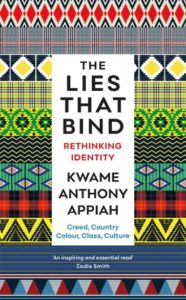 But Kwame Anthony Appiah’s book The Lies that Bind, a philosophical treatise on identity, reminds us that when we think about identity, we are often bound by myths as much as cultural realities, she adds.
But Kwame Anthony Appiah’s book The Lies that Bind, a philosophical treatise on identity, reminds us that when we think about identity, we are often bound by myths as much as cultural realities, she adds.
It is a mistake to think of nationalism as an inherently regressive or destructive political force. In fact, nationalism was the engine that established modern political liberty, and it has been a spur to diversity among nation, argues Yoram Hazony, author of “The Virtue of Nationalism.”
Historically, free institutions appeared and persisted in national states such as England, the Netherlands and Scotland—countries built upon a dominant national language and religion, as well as a history of setting aside internal differences to fight common enemies, he writes for The Wall Street Journal. By contrast…..
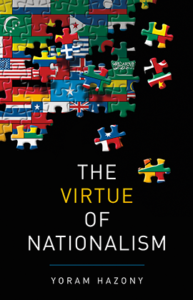 Like universalists of the old school—whether Christian, Muslim or Marxist—the new liberal universalists tend to reject the constitutional, religious and cultural diversity of independent nations. As they see it, the way of life they propose—the downplaying of national distinctions, the unrestricted movement of peoples and goods, the elevation of individual judgment over tradition in all areas of life—will provide what everyone needs. Not surprisingly, the correlate of this rejection of diversity among nations is often a disdain for diversity of viewpoints at home, in one’s own country.
Like universalists of the old school—whether Christian, Muslim or Marxist—the new liberal universalists tend to reject the constitutional, religious and cultural diversity of independent nations. As they see it, the way of life they propose—the downplaying of national distinctions, the unrestricted movement of peoples and goods, the elevation of individual judgment over tradition in all areas of life—will provide what everyone needs. Not surprisingly, the correlate of this rejection of diversity among nations is often a disdain for diversity of viewpoints at home, in one’s own country.
The threat to democracy posed by fake news and growing intolerance is well told in two timely books – The Coddling of the American Mind: How Good Intentions and Bad Ideas are Setting Up a Generation for Failure, by Greg Lukianoff and Jonathan Haidt, and The Death of Truth, by Michiko Kakutani – writes Edward Luce, the author of ‘The Retreat of Western Liberalism’:
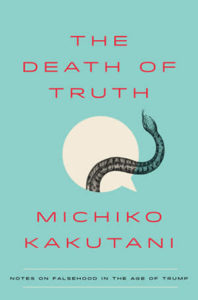 “The point of modern propaganda isn’t only to misinform or to push an agenda,” Kakutani writes, quoting a tweet from Garry Kasparov. “It is to exhaust your critical thinking.”…[but] her book suffers from a weakness common to all alarums about today’s democracy crisis: it is longer on lament than solutions. “Without truth, democracy is hobbled,” she writes. “The founders recognized this, and those seeking democracy’s survival must recognize it today.”
“The point of modern propaganda isn’t only to misinform or to push an agenda,” Kakutani writes, quoting a tweet from Garry Kasparov. “It is to exhaust your critical thinking.”…[but] her book suffers from a weakness common to all alarums about today’s democracy crisis: it is longer on lament than solutions. “Without truth, democracy is hobbled,” she writes. “The founders recognized this, and those seeking democracy’s survival must recognize it today.”
“Concept creep”
Lukianoff and Haidt, both of whom are liberal academics do a great job of showing how “safetyism” is cramping young minds, Luce adds:
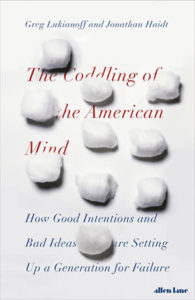 One impeccably liberal scholar was subjected to ostracism when she wrote an article questioning our double standards on identity. Changing gender is applauded, she pointed out, whereas altering your race is not. The first is treated as mutable; the second as fixed. Fellow scholars demanded that she retract the article. One accused her of the untranslatable crime of “discursive trans-misogynistic violence”. Note the instinct for censorship rather than debate. Note also the use of the word violence, which is being stretched to Orwellian lengths. It is part of the same “concept creep” that treats naturally resilient young minds as fragile things that need to be sheltered.
One impeccably liberal scholar was subjected to ostracism when she wrote an article questioning our double standards on identity. Changing gender is applauded, she pointed out, whereas altering your race is not. The first is treated as mutable; the second as fixed. Fellow scholars demanded that she retract the article. One accused her of the untranslatable crime of “discursive trans-misogynistic violence”. Note the instinct for censorship rather than debate. Note also the use of the word violence, which is being stretched to Orwellian lengths. It is part of the same “concept creep” that treats naturally resilient young minds as fragile things that need to be sheltered.
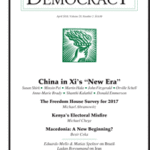 The July 2018 edition of the National Endowment for Democracy’s Journal of Democracy features an eight-article cluster on populist illiberalism in Central and Eastern Europe, an essay on authoritarian sharp power, and more. The NED’s International Forum asks five leading experts: What is the Root Cause of Rising Illiberalism in Central and Eastern Europe?
The July 2018 edition of the National Endowment for Democracy’s Journal of Democracy features an eight-article cluster on populist illiberalism in Central and Eastern Europe, an essay on authoritarian sharp power, and more. The NED’s International Forum asks five leading experts: What is the Root Cause of Rising Illiberalism in Central and Eastern Europe?







